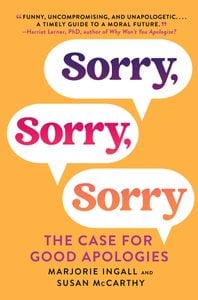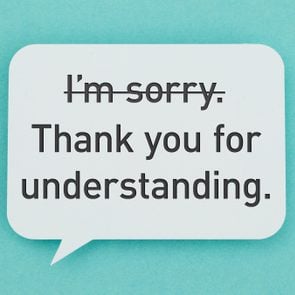How to Apologize Like You Mean It
Updated: Feb. 16, 2023

Apology experts name four main things to consider before you say "I’m sorry"
Apologies are superhero-like acts. That is, if you do them right. A bad apology, on the other hand, is a supervillain. It’s frequently worse than no apology at all.
This isn’t entirely your fault. Human brains are wired to make it hard for us to apologize, even when proper etiquette dictates that we should. We want to see ourselves as good people, which means the need to apologize creates cognitive dissonance. How can we have done a bad thing? We’re good! The bad thing must be someone else’s fault, or there must be mitigating circumstances, or our intentions must have been misunderstood! To apologize well, you have to overcome the self-protective, self-justifying barriers set in place by your own psyche. The brain’s desire to protect its owner (that’s you) is also why when we do apologize, we often do it in a way that avoids taking real responsibility.
So, if you’re considering apologizing for something you did wrong—whether you didn’t decline an invitation the right way, bulldozed over someone’s feelings or said something unkind or outright offensive—stop. Ponder these four questions before you attempt to apologize:
- Am I shifting the blame?
- Am I minimizing my offense?
- Am I sounding defensive?
- Can I apologize without reminding the other person that they’ve sinned too?
A good apology never contains the words “sorry if,” “sorry but” or “sorry you.” It doesn’t tell the other person that they’re overreacting, or that they caused you to do the very thing you’re now apologizing for. It doesn’t demand that the other person then apologize to you. It stands on its own, strong and noble, like Captain America stepping out of an elevator over a mound of HYDRA agents. (We think. It’s been a while since we’ve seen that movie.)
Get Reader’s Digest’s Read Up newsletter for more etiquette tips, humor, cleaning, travel, tech and fun facts all week long.
When it comes to apologies, forget perfection
Then again, maybe don’t think about emulating Captain America with your apologies. Perfect is the enemy of good, Voltaire supposedly said. Perfection is impossible; it’s not a reasonable goal for any of us. Failure is built into the business of being human. And when you accept that everyone is flawed, you can accept that we all have the choice to apologize well or poorly or not at all. All you can do is try your best.
So here’s a suggestion: When faced with a difficult apology, try practicing it to your mirror, your cat, a clump of dandelions. “I’m sorry, reflection.” “I apologize, FluffyPants.” “Dandelions, you were right. I was wrong. I should have listened to you.” Once you’ve gotten a positive response from reflection, FluffyPants and dandelions—or at least not a negative one—practice on a sympathetic (to you) friend. Tell them what happened. Ask them to think how they’d respond if they received an apology like the one you’re presenting. If they say they’d be irked, chances are the recipient you’re practicing for will be irked too. Now it’s on you to decide whether you’re capable of apologizing well or whether you should opt not to apologize.
How not to apologize
We’re pretty sure, however, that you can do better with your apologies than Sharon Stone did on the red carpet at Cannes in 2008. When asked for her thoughts about an earthquake in China a few days earlier, which had claimed more than 70,000 lives, she responded that the Chinese “aren’t being nice to the Dalai Lama, who is a good friend of mine,” and continued, “And then all this earthquake and all this stuff happened, and I thought, Is that karma? When you’re not nice, that the bad things happen to you?”
Many people found this statement unkind. Stone responded: “I misspoke. I could not be more regretful of that mistake. It was unintentional. I apologize. Those words were never meant to be hurtful to anyone. They were an accident of my distraction and a product of news sensationalism.”
Need we note that the words misspoke, regretful, unintentional, never meant, anyone, accident, distraction and news sensationalism do not belong in a sincere apology? Stone compounded the offense with this statement to the New York Times: “I am deeply saddened that a 10-second poorly edited film clip has besmirched my reputation of over 20 years of charitable services on behalf of international charities.”
Celebrities often blame the media for things they say, which thankfully is not a strategic option for the rest of us. Stone added a bit of extra zhuzh, to the effect of “I have been a saint for over 20 years and was entrapped.” Do not try this at home.
How to apologize the right way
In the hope that it will inspire you, we present an example of how healing a good apology can be. After the explosion of the Space Shuttle Columbia in 2003, NASA launch integration manager Wayne Hale publicly took the blame. Though he’d repeatedly raised safety questions privately (and was rebuffed by other NASA officials), he stepped up and apologized.
He said: I am at fault. … I stand condemned in the court of my own conscience to be guilty of not preventing the Columbia disaster. We could discuss the particulars: inattention, incompetence, distraction, lack of conviction, lack of understanding, a lack of backbone, laziness. The bottom line is that I failed to understand what I was being told; I failed to stand up and be counted. Therefore look no further; I am guilty of allowing Columbia to crash.
With these words, Hale took responsibility, acknowledged the impact, didn’t try to pass the buck. Imagine the guts this took.
And almost three years later, he apologized again. In the initial investigation of what caused the explosion, NASA investigators decided that improper installation of the foam insulation on the Shuttle’s fuel tanks was responsible. The media dutifully reported this. But then scientists discovered that improper installation wasn’t the cause after all; the insulation had failed because of the completely normal expansion and contraction of a full tank of fuel. NASA had neglected to test the insulation on full tanks, only on part-full ones. Which meant that the guys who’d installed the foam were innocent.
Hale flew to the foam installation plant in Louisiana to apologize personally, in an all-hands meeting, to all the assembly workers, for NASA’s wrongful placement of blame. It wasn’t their fault. He was so sorry. “Thin comfort for me to apologize: so late, so little,” he reflected on his blog later.
Is it, though? We think not.

Adapted from Sorry, Sorry, Sorry: The Case for Good Apologies by Marjorie Ingall and Susan McCarthy, copyright © 2023.


